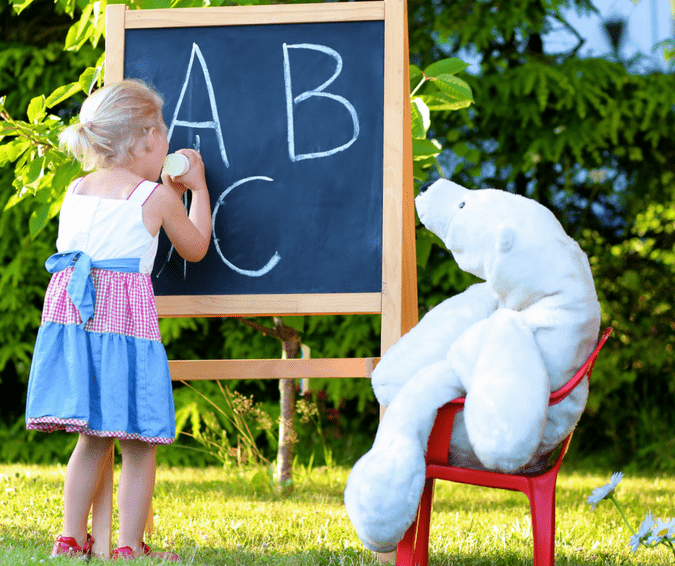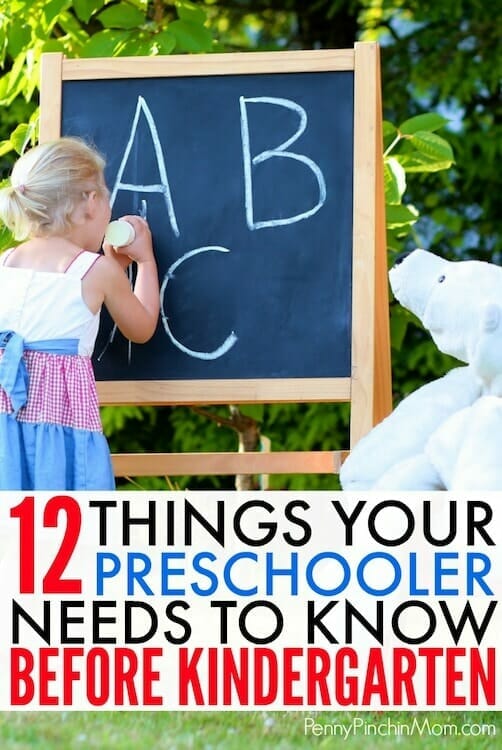I remember when my kids were little and we were getting them ready for their first day of kindergarten. I wondered if I had done enough to prep them for what they were going to experience. I worried about them being ready to attend school all day.
I mostly worried about their learning experience. Did I set them up for success by educating them myself at home? Would they struggle or would they excel?
I know these are things all parents think about. Did you do enough to help prepare your preschool student to get ready for kindergarten?
There are actually simple things we can do as parents to ensure that they are in fact ready for that next big step in their lives.
THINGS TO DO TO PREPARE YOUR CHILD FOR KINDERGARTEN
1. Give them a head start with numbers and letters
Many parents think that their kids will just learn this in school, so there is no need to teach them about this at home. Children should be able to identify the letters so that they can start to understand the sounds that those letters make. While teachers will do this, it can actually put your child behind other students and require additional catch up, which may leave your child feeling discouraged.
There are many things parents can do to help their kids. One of the simplest ways you can do this is by signing up for ABCmouse. This is an amazing online application which gives kids a kick start in learning important lessons which will help set them up for success in kindergarten.
You can sign up right now and get 2 months for just $5. That is only $2.50 per month! That will allow you to really dig in and make sure that it is the right fit for your child. If you like it, continue at just $7.95 a month.
I love that you can access this on your phone or tablet. So, you could be sitting at the doctor’s office and instead of touching all of the germy books and toys, your child could sit next to you and be learning (while they think they are just having fun)!
>>> Try ABCmouse for FREE for 30 days!! <<<
2. Have them practice writing their name
They all know their name, but have your child learn how to write those letters to spell it. Most kids will probably have already learned this in preschool, but it is good to have them keep practicing.
Don’t expect perfection – not at all. Just have them practice the letters over and over again so that when asked to write his or her name in school, your child can do so with pride.
To save money, use a dry erase board with lines instead of purchasing specially lined paper, which you will throw away. You can find these for around $5 or so at many stores.
3. Introduce sight words
When your child starts school, this will be one of the first lessons. It will include very simple words such as and, the, by. While your child will learn to read in kindergarten, having some basic understanding of some simple sight words can give them a head start in learning to read.
There is no worry about the fact that these words are just memorized. Honestly, that is what you want. You want your child to see the word “and” and then be able to recite it to you, just by recognizing the letters.
You can come up with your own way to teach these to your child. If you want some help, you can find books such as this 100 Write and Learn Sight Word Practice Pages or even fun flash cards (which fit into your bag).
4. Read. Read. Read
Yes, I meant to write that one three times because it really is that important. You can never read too many books to your kids.
This establishes the understanding of the importance of reading. There may be days when you don’t really need to use math, but you will read something every. single. day. Reading well sets up the foundation to help your child better learn other subjects such as math, science and more.
5. Learn to Button, Zip, and Tie
Start working with your child to teach him or her how to button and unbutton their pants and shirts. Help teach them how to connect and use a zipper. This way, he or she will be able to take care of these tasks in school (such as when a bathroom break is needed).
While many kindergartners struggle with tying shoes, you can still begin teaching your child about it. There will be a lot of frustration, but with practice, your child will catch on.
6. Eat lunch out of a lunchbox or on a tray
If your child has not attended a program where lunch is served away from home, this may be something scary to him or her. Buy the lunchbox and pack up the type of lunch you will send each day and enjoy a picnic with them.
Help your child learn how to open the containers and the importance of eating all of the food you send so they have a full tummy for the entire day.
If your child will purchase lunch at school, practice having him or her learn to pick up their plate of food, drink, and utensils and place them on the tray and carry it. It will help them have confidence when they arrive at the food line on the first day of school.
7. Know you are always there for them
Just as you may be nervous to send your child off to school, your child may feel the same. If he or she is very attached to you, the idea of being away from you may be frightening.
Give your child extra love and hugs while you work through the transition. If your child cries, don’t tell them that it is wrong. Instead, encourage your child with your words of support and understanding. Remind them how you have left them with grandma and always come back to pick them up. Give them all of the love and support they need to help them feel safe and confident.
These are some of the things you can do as a parent to make sure your kids are ready for the fun and exciting time of kindergarten. As far as mom having some boo-hoos of your own – I send my hugs your way.
SOCIAL SKILLS YOUR CHILD SHOULD KNOW BEFORE KINDERGARTEN
These were a few other thoughts submitted by some of our readers – and I think they are great!
8. Understand right from wrong and respect authority.
When your child starts school, he or she will have many situations being thrown at them. They need to not only understand right from wrong but also respect authority figures other than Mom and Dad (or their guardian).
Enforce rules at home and work with him or her to truly understand and learn to respect authority figures.
9. Take turns and play well with others.
This is tough for many kids to learn, so if you feel a challenge here, you are certainly not alone. Help your child learn to share and take turns without being bossy or rude to the other kids.
10. Be willing to take some risks.
Kindergarten is very scary and can create a lot of anxiety in children. Help your child learn how to make decisions on their own, but realize that this is a slow learning process.
11. Have empathy and know how to express it.
It is important that children learn how to express feelings is another skill children need to learn. They need to express how they feel. Otherwise, it could lead to hitting or other negative behaviors. This can lead to difficult social interactions with other kids as well as adults. Help them learn how to be constructive when it comes to expressing his or her emotions, but still be respectful of those around them.
12. Be able to work without supervision.
Your child’s teacher is going to have several kids to look over at once. That means your child may need to work on his or her own, without the teacher standing there supervising. Your child needs to be able to do the work assigned without needing to be constantly supervised.

